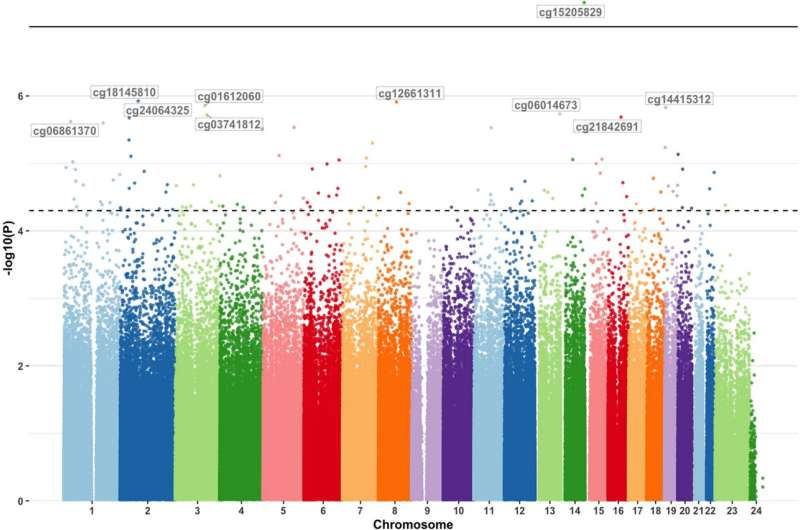This article has been reviewed according to Science X's editorial process and policies. Editors have highlighted the following attributes while ensuring the content's credibility:
fact-checked
trusted source
proofread
Chronic migraine research finds genetic mechanism to lower migraine frequency

DNA detectives from QUT have found a biological mechanism behind the reduction of migraine frequency in chronic migraine sufferers after their gradual withdrawal from migraine medications.
The study "Alterations in DNA methylation associate with reduced migraine and headache days after medication withdrawal treatment in chronic migraine patients: a longitudinal study" was published in Clinical Epigenetics and describes how researchers found epigenetic changes in two genes implicated in the transition from episodic migraines to chronic migraine.
First author QUT geneticist Professor Divya Mehta from QUT's Center for Genomics and Personalized Health in the School of Biomedical Sciences and QUT's Center for Data Science said chronic migraine was a major headache for about 2% of the general population.
"Overuse of acute headache pain relief and other medications is an important factor in the development and maintenance of chronic migraine," Professor Mehta said.
"We class migraine as chronic if the sufferer has headaches on 15 or more days a month for three or more months of which eight days fulfill migraine criteria, so it is a highly disabling type of migraine.
"Working with colleagues at Leiden University Medical Center (LUMC) in the Netherlands, we set out to understand the process of migraine chronification whereby attacks become more and more frequent in some migraine sufferers and how this process could be reversed.
"The research team investigated longitudinal changes in DNA methylation, an epigenetic modification, which are chemical 'tags' added to DNA molecules in response to environmental factors, including therapeutic drugs, that 'switch' genes on or off."
Co-first author and researcher molecular biologist and geneticist Dr. Heidi Sutherland from QUT's Center for Genomics and Personalized Health and School of Biomedical Sciences said DNA was analyzed from blood taken from the patients with chronic migraine at the beginning of and after the 12-week withdrawal from medication treatment.
"The patients kept a headache diary and those who had a greater than 50% reduction in monthly headache and migraine days (the responders) were compared with the non-responders to identify DNA methylation changes associated with their response to treatment," Dr. Sutherland said.
"Of all the patients, 59.8% had reverted to episodic migraine by the end of the 12-week withdrawal period.
"We found epigenetic changes in the HDAC4 gene that were associated with a mean reduction in headache days following the withdrawal of acute medication and that decreased DNA methylation levels were associated with reduced headache days.
"Secondly, we found that DNA methylation within the MARK3 gene was associated with a mean reduction in migraine days. Lower DNA methylation levels at baseline in MARK3 was associated with reduced monthly migraine days and found to be a biomarker to predict response."
Professor Mehta said the findings had huge clinical implications as they indicated that these genes might be novel therapeutic targets for migraine.
More information: Divya Mehta et al, Alterations in DNA methylation associate with reduced migraine and headache days after medication withdrawal treatment in chronic migraine patients: a longitudinal study, Clinical Epigenetics (2023). DOI: 10.1186/s13148-023-01604-8




















